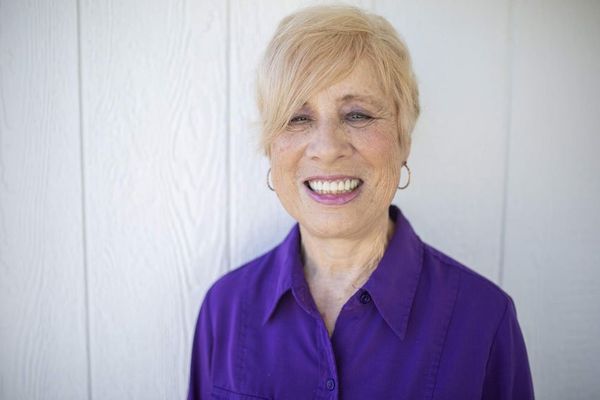As told to Nicole Audrey Spector
It all started back in 2003 when I was 13 years old. I was anemic, falling asleep while sitting up and dangerously skinny despite eating normally. My mom took me to a doctor to get checked out. The doctor’s immediate conclusion? Disordered eating.
My mom and I are close and she knew that I didn’t have disordered eating, so she advocated for me to get more tests. Finally we were referred to a gastroenterologist, who ordered a colonoscopy. After the test, the diagnosis was practically instant: I had Crohn's disease.
Some live with Crohn’s disease for years and don’t know it, so I consider myself super lucky to have gotten the diagnosis so fast. Still, this wasn’t good news. Crohn's is a lethal disease that has no cure. There are several types of treatments and you can go into remission, but once you have Crohn's, you have it for life.
And I had a particularly severe case. I would have to get up very early every morning to basically poop my brains out. My life revolved around these symptoms and trying to prevent them. I starved myself and barely even drank water to avoid going to the bathroom constantly. And even then my body sometimes lost control … so I wore pads in my underwear most of the time.
My condition deteriorated throughout my teens. I was taking various medications to help, but they really didn’t do much. My life got smaller and smaller. I had a few close friends who knew about my illness (and treated it with a welcome sense of humor), but getting through the school day was miserable. I was usually thirsty and hungry because I knew if I didn’t deprive myself of food and water, I’d pay for it in the bathroom.

The nurse’s office gave me a special laminated pass that let me use the bathroom whenever I needed — a rare and weird perk. Normally students could only leave class to use the bathroom three times a semester!
But the pass didn’t solve what was going on inside me. My gut was a disaster. Some days I’d have to leave school early because of rectal bleeding.
I moved from Chicago to Michigan for college after high school, where life got even worse. I had a feeding tube implanted in my stomach and the incision wound didn’t heal properly so I got blood and pus all over my clothes. I rushed to a doctor to get help and he literally sniffed the site and said, “It doesn’t smell infected” and sent me on my way. I’ve met some very dismissive doctors along the way.
Thankfully the nurses at my campus health center figured out I had a staph infection and treated me with antibiotics.
But my illness was just too intense and I wasn’t getting the care I needed in Michigan.
One local doctor advised me to go back to Chicago to get care. I took his advice, dropped out of college and moved back home to undergo ostomy surgery. This option had always been on the table, but doctors were keeping it as a last resort because it’s a very intense and serious procedure. They’re particularly reluctant to put young women through it, because it can scar your fallopian tubes and change the positioning of your uterus, which can affect fertility as well as worsen menstrual cramps.
But by then I was so sick, there really was no other option for me but major surgery.
I had my entire large intestine — which no longer even looked like the organ it was — removed. The end of my small intestine was routed to what is called a stoma. The stoma is a small red circle that sticks a half inch out of my body. This drains into an ostomy bag, which collects waste.
My health instantly improved and I gained a very necessary 30 pounds after surgery, but using an ostomy bag took some getting used to, both physically and emotionally. I mean, they’re not exactly celebrated by society. People tend to be grossed out by them. And I get it. Having your waste collected outside of your body is a weird concept. But people who aren’t familiar with ostomy bags seem to have huge misconceptions about them. They may think of them as being bulky clear bags that are filled up with liquid waste sloshing around.

Maybe they were once like that, but ostomy bags are smaller and flatter now. You can also get what’s called a Stealth Belt, which gives you support and helps keep the bag snug against your body, so that there’s no sloshing, and so you can better conceal it under clothing. The Stealth Belts come in fun colors too. Overall, they make the whole experience more comfortable and using them has helped build up my confidence.
It’s been well over a decade since my ostomy surgery and since then, I’ve completely embraced my ostomy bag as a normal part of my body, and I’m not at all ashamed of it, just as I’m not ashamed of any other part of my body.
Growing to embrace my body as it is today hasn’t been a solo journey. My mom has been an amazing support and advocate for me since day one. Additionally, I’m very active in an awesome community made up of others with ostomy bags. We empower one another. I also do a ton of advocacy work focused largely on helping younger people with ostomy bags connect, socialize and have fun.
The ostomy bag hasn’t fixed everything. I still have Crohn's disease and health problems related to it, including joint pain, fatigue and chronic anemia for which I need regular iron infusions. I’m also at a high risk for sepsis, which can be deadly.
Life with Crohn's disease can be, to put it mildly, really unpleasant. And ostomy bags can freak people out. It takes a certain amount of maturity to understand that they’re just a different way of going to the bathroom. I try to stay positive, grateful and focused on paying it forward.
Our bodies are precious, and I love mine — ostomy and all.
Have a Real Women, Real Stories of your own you want to share? Let us know.
Our Real Women, Real Stories are the authentic experiences of real-life women. The views, opinions and experiences shared in these stories are not endorsed by HealthyWomen and do not necessarily reflect the official policy or position of HealthyWomen.
- After Years of Suffering and Shame, I’m Now a Proud Crohn’s Warrior ›
- Meet the Badass Women Supporting Other Women in Their Health Journeys ›
- Ostomy Basics - HealthyWomen ›
- Crohn's Disease and the Challenge of Eating Out - HealthyWomen ›
- Crohn's Disease: It Didn't Keep Me From the Olympics, and It Won't Stop Me Now - HealthyWomen ›
- I Became a Cancer Survivor at Age 3 - HealthyWomen ›
- A Letter to My Diagnosed With Crohn's Self–From the Future - HealthyWomen ›
- On Reaching Remission of Crohn's Disease - HealthyWomen ›







